It’s the talk of the town in every industry and probably the biggest technological development in recent years. Unless you’ve managed to evade all tech news in recent years, you’re likely aware of the meteoric—and still developing—growth of AI aka artificial intelligence. If you want to start using AI for marketing your small business, I’ve compiled 31 essential AI marketing statistics to make the case.
These numbers tell a bigger story about AI’s impact on marketing today, how businesses big and small are using artificial intelligence marketing, and how it’ll shape the industry moving forward.
General AI Marketing Statistics
The few years since AI’s arrival in the marketing field have been a whirlwind of innovation, regulation, and lots and lots of learning. But one thing’s for sure: AI’s permanently altered the marketing landscape.
It’s changed marketing processes, the industry, and even consumers’ purchasing behaviors. Below are some of the most important AI marketing statistics that illustrate AI’s role in the marketing industry today.
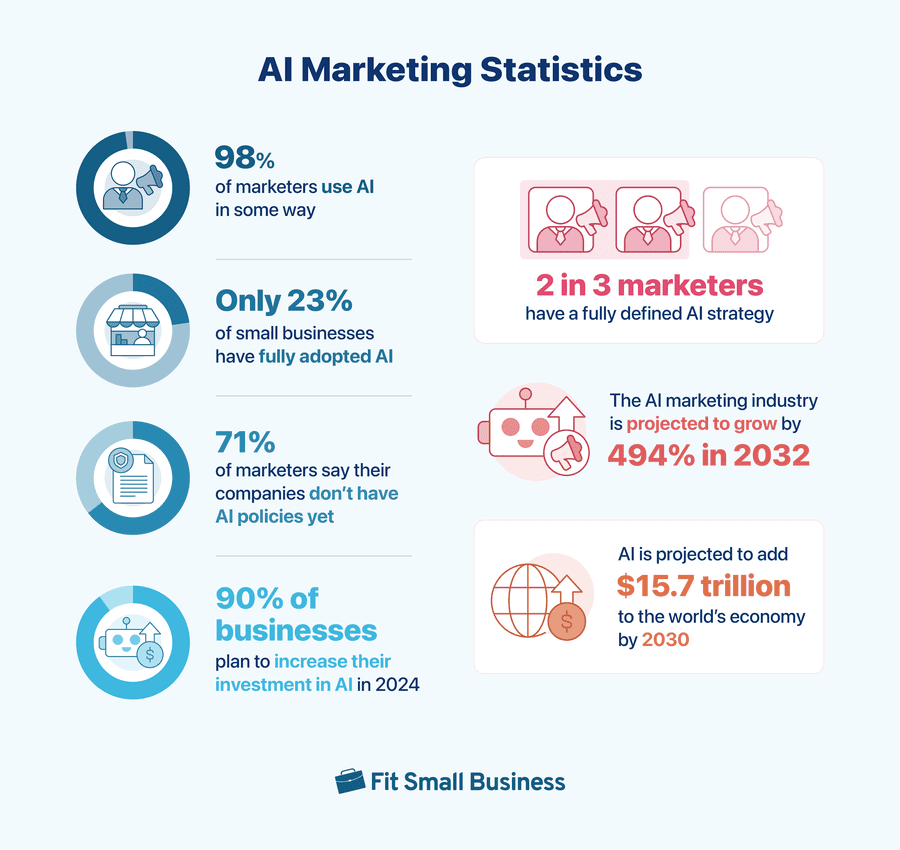
1. 98% of marketers already use AI in some way
Ever since the explosion of AI marketing tools beginning with ChatGPT launching in November 2022, businesses and marketers have been quick to adapt.
According to a 2023 survey, 98% of marketers already use AI in some way, whether experimentally, personally, or fully integrated into their processes. Most (45%) are in the experimental phase, while a small but growing minority have fully adopted it.
What is clear, however, is that excitement around AI tools is still high among many marketers. And it’s not surprising: AI has many uses in marketing, from simplifying market research to creating more accurate marketing campaigns to building brand presence. The key challenge is knowing where and how to leverage AI tools for your business’s best benefit.
2. Only 23% of small businesses have fully adopted AI
While 61% of small businesses have tried out AI, only 23% say they’ve fully adopted it into their systems. That’s according to a 2023 survey by the US Chamber of Commerce among small business owners.
However, while the number of business owners is small, optimism among them is high. Of that number, 82% said using AI has increased their efficiency, and 84% are optimistic that it’ll help their business’s future growth.
So while AI is only enjoyed by a small population (so far), it’s a number that’s likely set to increase. Those that have embraced AI in its early stages are now seeing mostly positive returns on their investments.
3. 71% of marketers say their companies don’t have AI policies yet
If there’s a possible reason behind the growing apprehension of AI in marketing, here’s one of the likeliest: most businesses don’t have AI policies in place yet. A survey by the AI Marketing Institute found that 71% of the companies marketers worked in didn’t have any AI policies at all. In contrast, only 21% of companies had them, and 8% were unsure.
However, these figures are still bound to change. With growing concerns and discussions on AI ethics ongoing, creating policies will likely be more of a priority for businesses in the coming years. The European Union was even the first to enact official AI regulations in December 2023—a decision likely to impact many others across the globe.
4. 90% of businesses plan to increase their investment in AI in 2024
AI’s meteoric rise isn’t stopping anytime soon. According to surveys among business owners, 90% said they plan to increase their investment in AI over the next year, with 34% even planning significant increases. What’s even more interesting is that smaller companies (with fewer than 1,000 employees) are 15% more eager to invest in AI than large companies.
What’s apparent is that businesses and marketers are seeing the value of AI and are eager to hop aboard the hype wagon. There’s no stopping you from doing the same—as long as you wield it strategically and follow proper guidelines.
Pro Tip: Proper use of AI tools includes knowing how to write good prompts, training yourself to leverage the right tools, and always editing before publishing AI-generated content. Learn more about AI content generation and how to use it the right way.
5. 2 in 3 marketers have a fully defined AI strategy
According to a November 2022 survey, two in three, or roughly 67% of marketers, have a fully defined AI strategy. In 2024, it’s more likely for that number to increase, with dozens of new AI tools cropping up in the years since.
And what are marketers doing with AI? They’re automating customer interactions, creating better content, and personalizing customer experiences (more about this below).
These AI marketing statistics show that the scales are tipping toward the widespread adoption of AI in marketing. The only question is how you can leverage these tools to benefit your small business’s growth.
6. The AI marketing industry is projected to grow by 494% in 2032
The global value of the AI marketing industry in 2023 was approximately $23.5 billion. In just eight years, it’s expected to grow to over $139 billion—a growth of 494% (with a compound annual growth rate or CAGR of 22% as of August 2024).
This is only the tip of the iceberg of AI’s steadily growing value in marketing. Today, marketers already use AI for market analysis, creating personalized search recommendations, and improving customer service and experience.
Tomorrow, it can likely do augmented reality, more humanlike chatbots, and even personalized product recommendations, all of which will impact customers’ expectations from brands.
7. AI is projected to add $15.7 trillion to the world’s economy by 2030
According to AI in marketing analytics, AI’s contribution to the world’s GDP is projected to be within $15.7 trillion in 2030. The study also found that AI is bound to boost local economies’ GDP by 26% by that same year. Researchers predict that this growth will be driven by enhancements in product variety, personalization techniques, and affordability.
Aside from marketing, other areas where AI will make the most impact are healthcare, automobiles, financial services, retail, manufacturing, energy, and transportation.
How Businesses Use AI in Marketing: Statistics and Insights
You already know that businesses are using AI for marketing. The question is how they’re using them. With the plethora of tools available—and more seemingly cropping up every week—one of the biggest questions is how businesses, including small businesses like yours, are leveraging them for growth. The AI marketing stats below will help you find out.
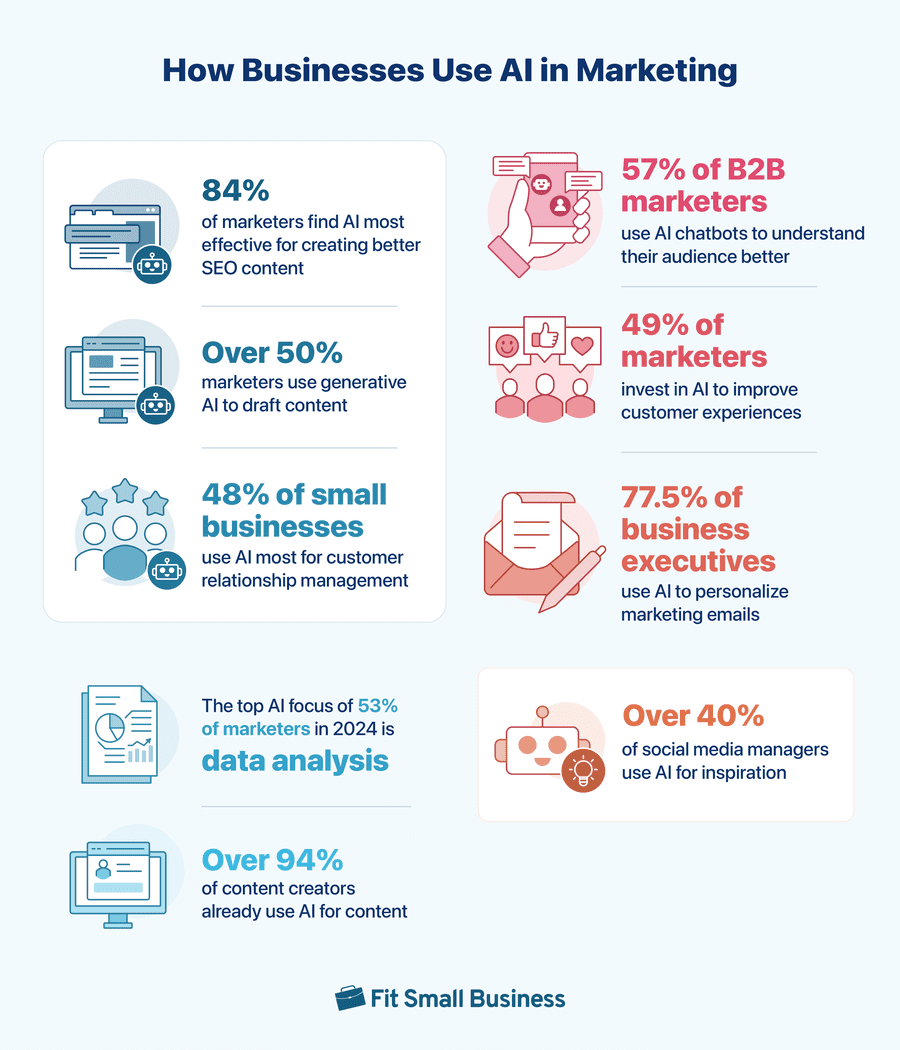
8. 84% of marketers find AI most effective for creating better SEO content
Specifically, 84% of marketers in a 2023 survey said they found AI most effective in helping align their web content with audiences’ search intent. AI tools can understand and analyze user intent and behavior more accurately, which businesses use to create better content that aligns with their audiences’ needs and interests more accurately.
This is important because understanding your audience’s preferences and interests is the cornerstone of effective SEO content marketing. Beyond doing basic keyword research, it’s also important that your content directly answers what your audience is looking for when they research online.
Interestingly, marketers’ second-most-effective use for AI was in automation, i.e., automating processes like email marketing or social media marketing, followed by improving user experience.
9. Over 50% of marketers use generative AI to draft content
One of the biggest subgenres of AI in marketing is generative AI, aka AI that generates content like text, images, or video. It’s the category that tools like ChatGPT and Google’s Gemini fall under. And sure enough, over 50% of marketers use these tools to draft content, whether for social media, blog posts, or website copies. Meanwhile, 48.5% use them to help brainstorm ideas, and 33.2% for research.
It’s no secret that marketing relies on creating a lot of content, and that’s an area where many marketers find AI helpful. While AI content creation isn’t slowing down anytime, it’s important to remember that it’s not always accurate. It’s your responsibility to double-check it for any errors before publishing it live.
AI creates content using something called NLP, or natural language processing, which is the technology that enables AI tools to mimic human language and understand human behavior. Understand how AI fits in content marketing, or find the best AI content tools for your content marketing strategy.
10. 48% of small businesses use AI most for customer relationship management
While marketers use AI mostly for content, the picture’s a little different when you zoom in on small businesses. According to a 2023 study, 48% of small business owners use AI most for customer relationship management. In contrast, only 36% use AI for content marketing. It shows a contrast in purpose: while larger businesses focus primarily on customer retention, small businesses are still in the acquisition stage.
Neither is more important than the other. The biggest takeaway is that AI is useful for many purposes and can be applied to any of the sales pipeline stages.
11. 53% of marketers’ top AI focus in 2024 is data analysis
The AI marketing stats above all show how marketers and businesses have been using AI, but it’s also important to know the look ahead. In a December 2023 survey, 53% of marketers said their top priority for AI in 2024 is leveraging it for data analysis.
In marketing, data analysis revolves primarily around understanding audience behavior to craft more accurate and effective marketing campaigns that don’t waste any extra budget.
Using AI for data analysis is also unsurprising. Market and audience research takes a lot of time and effort for even the most seasoned marketers, whereas AI can crunch tons of data and numbers in minutes, often with more accurate precision.
12. Over 94% of content creators already use AI for content
The creator economy is unrelentingly growing, so it’s not surprising it’s also caught up to AI tools. What is surprising is the speed with which creators have adopted it. In 2023, only 5.5% of creators in the US said they did not use AI—meaning over 94% already use AI in their content creation. Moreover, the study also found that 21% of creators used AI for editing content and generating images and videos.
If anything, these AI marketing analytics show the volume of content needed to thrive in today’s content-driven digital landscape. Content creators need to create more content than ever, which means a much stiffer competition to stand out.
Pro Tip: To create good content, you must do the following:
- Understand your audience’s needs, wants, and pain points.
- Learn where and how your audience spends their time online.
- Create a content marketing plan that leads audiences through your sales funnel.
Get the blueprint for creating good content in our guide to content marketing and its key strategies.
13. 57% of B2B marketers use AI chatbots to understand their audience better
57% of B2B marketers use chatbots to gain a deeper understanding of their audience, according to surveys by Statista. Aside from understanding audiences, they’re also using AI chatbots to generate new leads (55%), educate prospects (43%), and qualify leads (42%).
While AI chatbots have their pros and cons, a significant advantage is their ability to process data points in real time, helping you build more accurate customer profiles. This ultimately helps you build better customer experiences and relationships.
14. 49% of marketers invest in AI to improve customer experiences
Nearly half (49%) of US marketers are increasing their budgets for AI to improve customer experience. A large number of that spending is in customer service, mostly with AI-driven chatbots or sales AI recommendations. So if you’re looking to adopt AI to improve your customer service, you’re not alone. You can use AI in customer service and experience with AI chatbots and personalized recommendations.
15. 77.5% of business executives use AI to personalize marketing emails
AI is also helping to transform how top executives are writing their marketing emails. According to a 2022 study, 77.5% of executives already use AI to personalize their emails. By leveraging data-driven insights, AI can help you deliver tailored email content that resonates with each recipient’s interests and needs, creating more value for your customers.
16. Over 40% of social media managers use AI for inspiration
AI has also made waves in social media. In a 2024 survey, 40% of social media managers said their primary use of AI was in getting inspiration. Meanwhile, following just behind was using it to create copy, while interestingly, fewer than 10% used it to generate imagery.
So while there’s no question social media managers have adopted AI in their daily tasks, it’s noteworthy that they’re being careful to maintain authenticity and a human-first approach.
This is because social media has always thrived on authenticity. People come to social media to have real, meaningful interactions, whether with other people or with brands. If you use 100% AI-generated and inauthentic content on social media, people will know—and will unlikely form meaningful connections with your brand.
AI Marketing Stats: Top Tools to Incorporate Into Your Strategy
AI tools are one of the fastest-growing areas in marketing today. You’ve probably heard of ChatGPT, Copy.ai, or Midjourney. AI tools like these have been cropping up and storming businesses worldwide, but which ones are businesses using most? Find the answer in these AI marketing stats.
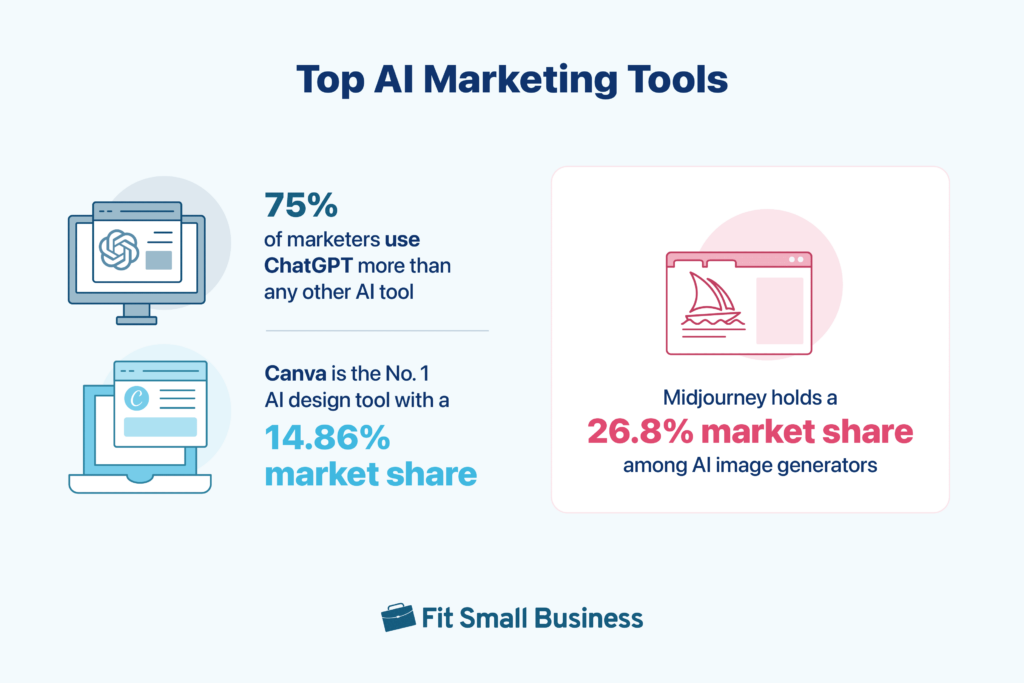
17. 75% of marketers use ChatGPT more than any other AI tool
ChatGPT started the modern AI revolution, and it’s still leading the way today. In a 2023 survey, 75% of marketers and advertisers said they used ChatGPT more than any other AI tool, significantly higher than even the second-most-used tools, Bing and Bard (now Gemini), both of which are used by 17% of respondents.
The likeliest reason for this is ChatGPT’s versatility. It can conduct research, generate content, organize schedules, and much more. It’s also very easy to use and free. Aside from the aforementioned, other widely used AI tools are Midjourney, DALL-E, and Adobe Firefly.
18. Canva is the No. 1 AI design tool with a 14.86% market share
ChatGPT is the most widely known and used AI tool worldwide. But its most significant drawback is its inability to generate images and designs. It’s likely for that reason that the most-used AI design tool is none other than Canva, which holds a 14.86% market share among other AI tools in July 2024. In fact, Canva is the only AI design tool in the top five.
This data only shows how important AI tools have been in content creation, and Canva’s addition of AI tools to its already popular platform has placed it among the world’s top AI platforms.
Pro Tip: Focus on integrating AI tools into areas where they can enhance your marketing strategy or address its biggest challenges, like improving keyword research or optimizing campaigns. To help you, we’ve rounded up the best AI marketing tools for everything from website building to SEO and more.
19. Midjourney holds a 26.8% market share among AI image generators
That’s more than any other AI image generator, including DALL-E and NightCafe. While AI image generators aren’t as widely used as text generators in marketing, businesses are still steadily experimenting with them. And one tool they’re using more than others is Midjourney, which has a 26.8% market share and can generate images—even full artworks—from just a few text prompts.
This has been met with equal enthusiasm and criticism, depending on how you use art. Some businesses find it useful for generating images for ads, while others question its legitimacy as “real art.” What is clear is it’s far from perfect. AI-generated art still makes significant errors and primarily depends on how you prompt it.
AI Impact on Marketing: What the Numbers Say
Above all, the AI marketing stats point to one conclusion: AI is here to stay. In the few years since “generative AI” and “ChatGPT” entered the business lexicon, it’s affected how businesses work and run.
Like any tech innovation, there are pros and cons. Whether it ultimately works best for your business depends on how you manage it. Review the numbers on how AI has impacted marketing for business owners.
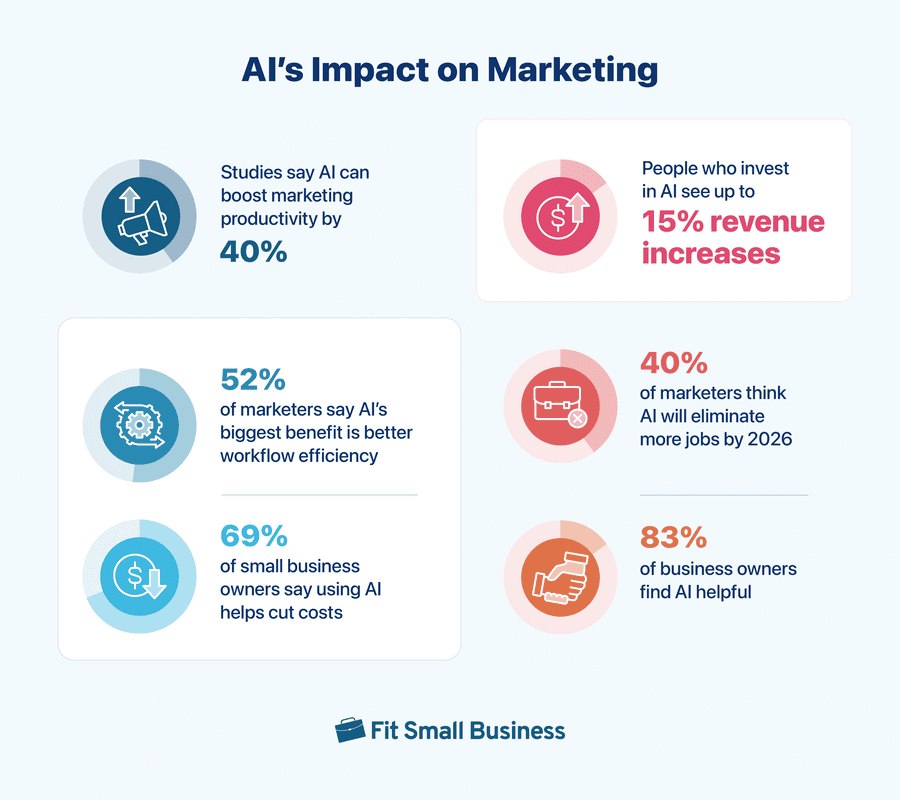
20. AI can boost marketing productivity by 40%
That’s according to a 2023 study among highly skilled workers, which ultimately found that AI software like ChatGPT improved their productivity by up to 40%. What’s even more interesting is that the study had subjects performing marketing tasks, including content writing and pitching.
However, it also concluded that rather than following AI blindly, workers should actively work alongside it and validate its processes to create better output overall.
Researchers also underscored the importance of accountability and finding where AI fits best into your workflows. These findings point to the need for responsible and meaningful integration of AI into your processes, including careful research and testing.
21. 52% of marketers say AI’s biggest benefit is better workflow efficiency
This probably comes as no surprise, but for the majority of marketers (52%), AI’s biggest benefit is in helping speed up workflows and increase efficiency. It does this by automating several marketing processes, from email campaigns to industry and audience research.
By and large, marketers are using AI to take over the more routine tasks in marketing to help them focus on the bigger, more important tasks like creative work and decision-making. It’s a good prerogative to follow. Instead of relying on AI 100% to take over your responsibilities, use it to enhance your existing processes instead.
22. 69% of small business owners say using AI helps cut costs
AI can streamline work processes more efficiently, but its other big benefit is in decreasing costs. Recent surveys found that 69% of small business owners said using AI has helped them limit cost increases.
Cost is one of the biggest areas where AI tools can benefit small business marketing. For example, instead of hiring costly web design agencies, businesses can use AI website builders to build an equally good business website. AI tools can also target ad campaigns more accurately to reduce wasted ad spend.
23. People who invest in AI see up to 15% revenue increases
Not only has AI helped businesses cut costs, but it’s also proven to increase revenue directly. According to new research from McKinsey & Co., businesses that invested in AI are seeing revenue increases of between three and 15% and ROI increases of up to 20%.
Particularly, the players seeing these results used AI to create more targeted and hyper-personalized marketing campaigns. They’re using AI not just to experiment, but also to strategize and create more precise customer experiences.
It’s an excellent example of using AI to enhance a working process. Today’s customers expect more personalized experiences than ever from brands, which is an area AI can help in.
24. 40% of marketers think AI will eliminate more jobs by 2026
While AI has provided multiple benefits, it’s also caused some concerns, primarily in job security. When asked about how they think AI will impact their jobs in the next three years, a 2023 survey found that 40% of marketers believed more jobs would be eliminated as a direct result. Compare that with less than 10% who believe AI won’t affect their jobs at all.
Also interesting to note is that this figure increased significantly in just one year. In 2022, when asked the same question, only 22% of marketers believed their jobs would be eliminated by AI. Part of the cause of this is the rapid advancement of AI in just a few years.
25. 83% of business owners overall find AI helpful
AI has had a measurable impact on the marketing industry, but most business owners have found its impact positive. In a 2023 survey, 83% of small business owners and executives say AI’s impact on their marketing efforts has been prominently positive. 40% of that number even said it was “very helpful.” In contrast, only 2% found AI to have no value for their marketing efforts at all.
According to that survey, the people who found AI valuable used it mostly for creating content, streamlining and automating repetitive tasks, and helping with accounting and finance. Two of these three tasks directly involve marketing.
AI in Marketing: Perceptions, Uses & Concerns
AI’s arrival on the tech scene has sparked just as many discussions as it has brought innovations. It’s still one of the most widely debated topics today, with supporters emphasizing its increased efficiency, while critics protest its security and transparency risks.
Businesses are also divided about the use of AI—although many seem to be on its side. Below, we’re looking at AI marketing stats on how it’s perceived and used by businesses, along with top concerns.
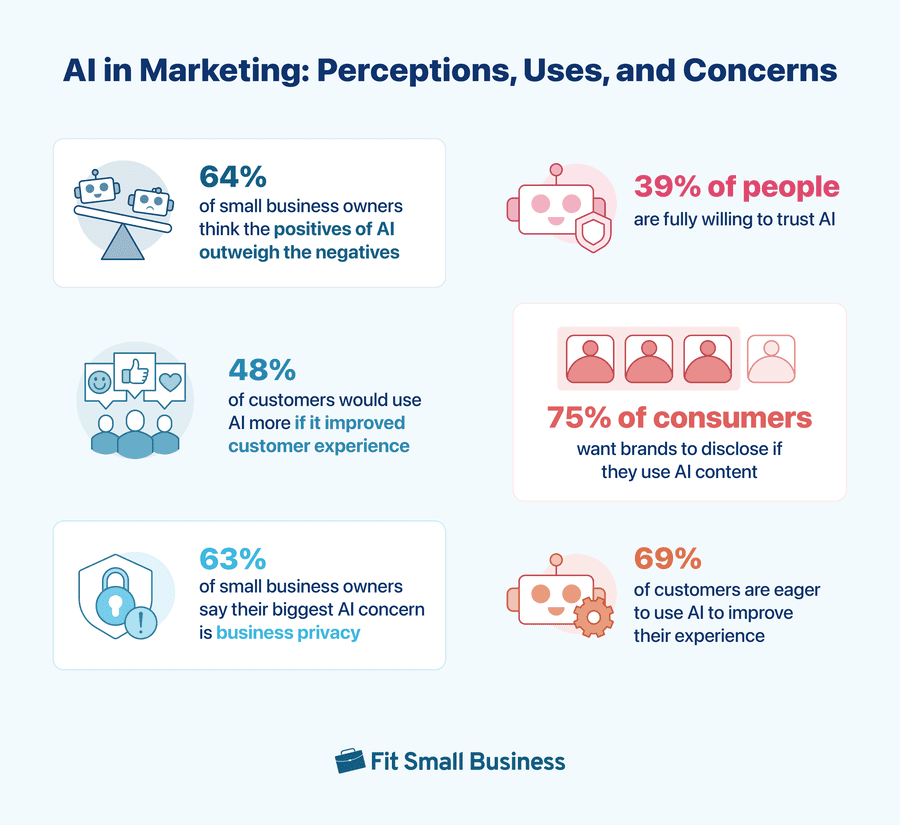
26. 64% of small business owners think the positives of AI outweigh the negatives
While AI is one of the most divisive issues today, business owners and marketers still generally see it in a positive light. Studies found that two-thirds, or 64% of small business owners, think AI’s positives outweigh its negatives. Although of that number, only 24% definitively think so, while 40% are somewhat on the fence.
While some of AI’s biggest benefits are increased efficiency and lower costs, its biggest drawbacks are privacy and security issues and the potential to take away jobs from humans. Ultimately, whether it provides more opportunities or limitations is entirely up to your main priorities. But what’s important to remember is that it’s only a tool—it’s your responsibility to wield it properly.
27. 48% of customers would use AI more if it improved customer experience
This is one of the best examples of how to leverage AI effectively to improve your marketing processes. According to surveys, 48% of customers said they’d be comfortable using AI more often if it made their experiences with businesses more convenient. A more seamless customer experience means more happy customers, which increases their probability of returning to your business.
28. 63% of small business owners say their biggest AI concern is business privacy
AI offers plenty of benefits, but it also has some drawbacks, too—least of all privacy. According to surveys among marketers and small business owners, 63% said their biggest concern in adopting AI was risks to their business’s privacy. Additionally, 62% also said their top concern was customer privacy.
Privacy has been a prescient issue in technology for a few years, with data leaks and tech surveillance becoming common issues that decrease customers’ trust. There are no solid solutions to these problems yet, but most important of all, proceed with caution with all things AI. Don’t input sensitive data into AI systems, and always review your AI tools’ security measures.
29. 39% of people are fully willing to trust AI
AI isn’t without its complications. Among the issues that plague it to this day are privacy concerns and lack of transparency. And according to global surveys, only 39% of people are fully willing to trust AI systems.
The remaining 61% were either unwilling or ambivalent about AI. This sentiment varies across countries, with countries like China and India being more trusting. But notably, all agree on trusting AI with security the least.
30. 75% of consumers want brands to disclose if they use AI content
While marketers on the whole are positive about AI, there’s more wariness when it comes to consumers. Studies show that while most have already generally accepted AI as the future of tech, a good number still value transparency more than anything.
75% of customers say they want brands to disclose if they used AI to create their content, whether text, images, or video. The same number also wanted transparency about products or services using AI.
It’s clear that customers are cautiously optimistic about the possibilities of AI for business use. But more than anything, they want brands to prioritize its benefits, as well as transparency on how they use it.
31. 69% of customers are eager to use AI to improve their experience
Even if fewer than 40% of people fully trust AI, a 2022 study found that 69% of people were still willing to use AI if it could improve their experiences. This shows a positive trend in the perception of artificial intelligence tools since only 60% of people were willing to do so in the same study in 2020. And if that trend continues, it’ll keep growing in the next few years.
Frequently Asked Questions
Approximately 98% of marketers already use AI in some way. However, only about 67% have a fully formed AI marketing strategy, and only under a quarter have fully integrated their marketing systems with AI. However, the AI marketing industry is projected to grow exponentially in the coming years, with 90% of businesses planning to increase their AI investment in 2024.
AI has impacted marketing mostly by helping create content like blogs and websites, automating tasks like email and social media campaigns, and targeting campaigns more accurately thanks to more precise data insights. AI has also helped simplify market research and analysis, and studies say it improves productivity and workflow efficiency. On the flip side, AI has also increased privacy, credibility, and job security concerns.
In 2023, the AI marketing industry was worth approximately $23.5 billion. It’s expected to grow to nearly $140 billion in 2032. The AI marketing market also encompasses both big enterprises and small businesses, with both planning to increase their investment in AI in the next few years. Researchers also project that the AI industry as a whole will contribute $15.7 trillion to the world’s GDP by 2030.
Bottom Line
Marketing today is almost inextricable from AI, with new tools cropping up on the regular—with twice as many discussions and debates. The AI marketing statistics above paint an encompassing picture of the good and bad. Ultimately, adopting AI comes down to deciding how you’ll wield these tools for your small business. One thing’s for sure: AI is here, and it’s changing how all businesses do marketing.